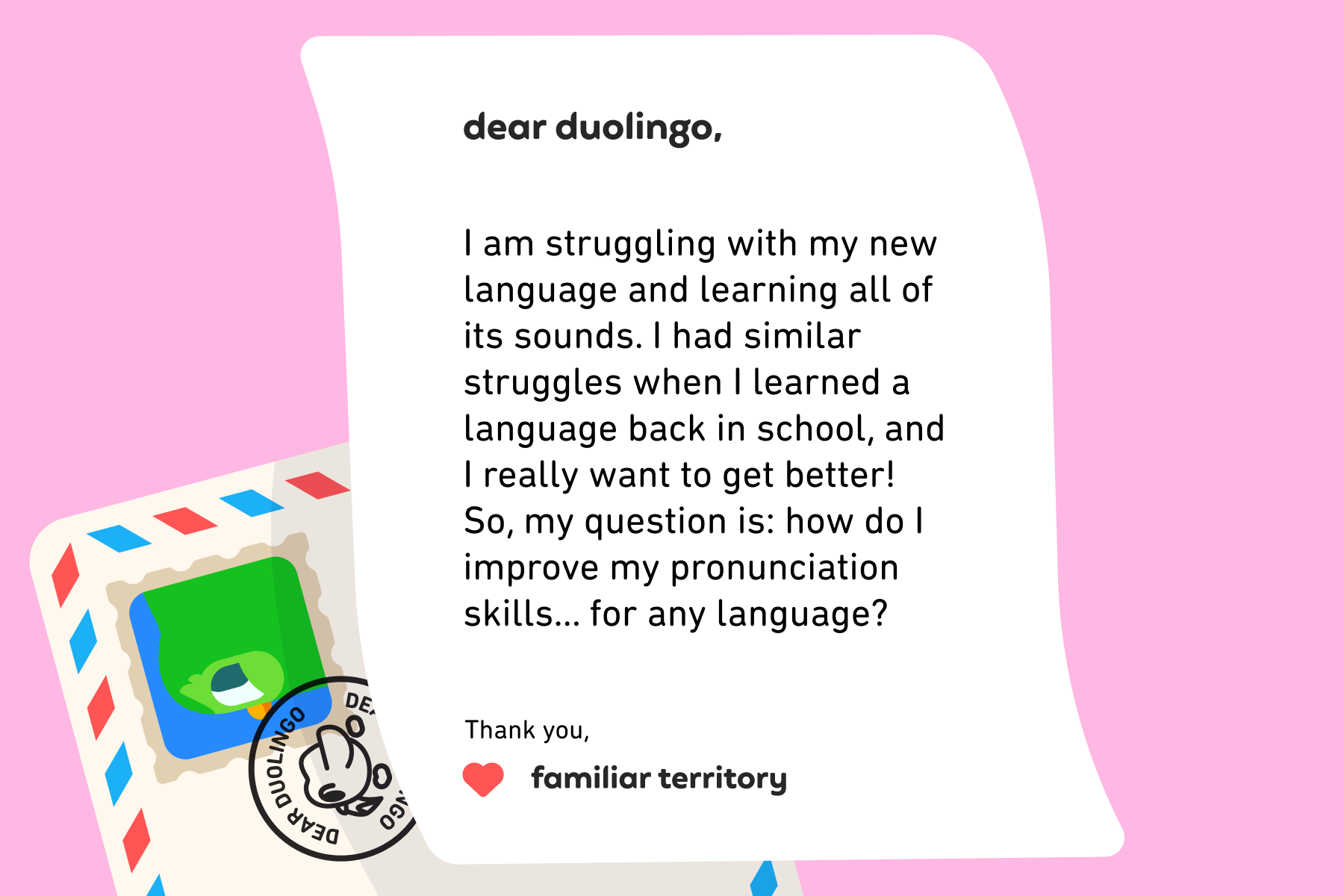Welcome to another week of Dear Duolingo, an advice column just for language learners. Catch up on past installments here.
Hello, learners! This week’s topic is a fun one, because it opens the door to the exciting world of sounds in your new language. Let’s dive in:
The question is:

Ah, Hear Me Out: you’re not alone! Even before we can say or understand words in our first language, our little brains are hard at work figuring out the sounds and pronunciation we need to communicate… so if you're a grown-up learning the sounds of a new language, you have to re-learn something your mouth and muscles have been doing for decades!
No matter what spoken language you're studying, some sounds will be easier for you to make than others. Don’t get too hung up on those difficult sounds— there are probably other aspects of pronunciation that you've already gotten the hang of. This week, we'll share some pronunciation tips for all learners, but keep an eye out for language-specific tips in the future!
Speak slower
Give yourself permission to sound different in your new language, including by speaking slower. It’s easy to feel tongue-tied, and slowing down can give you a bit more time to formulate what you want to say, and get your tongue ready for the next word. This is especially good advice for intermediate and advanced learners, who may know the words to say but still feel tripped up by the sounds!
Listen more
Do lots of listening practice to help train your ear, and, indirectly, your mouth! Listening to natural, casual language like on TV or podcasts can be especially helpful, but any listening practice will get you learning. You might also check out news or sports broadcasts and music to get used to the rhythm of the language, its words, and the specific pronunciations of consonants and vowels. (Fun fact, this helped Colombian musician Juanes learn English!)
Read aloud
Reading out loud is a low-pressure way to get used to producing the sounds and words in the language. Plus, you don't actually have to focus on understanding or creating the ideas yourself. This is a great way to get comfortable speaking! You can do this during your daily lessons—even if it’s not a speaking exercise, you can repeat after the character, or read your sentence aloud after typing.
Focus on what gets you understood
Some kinds of sounds matter more for comprehension than others! Sounds range from "this will help make my meaning clear" all the way down to "This may not be how most speakers pronounce it, but it's not getting in the way." Prioritize practicing the sounds that matter for meaning! You don't need to sound like you've used the language your whole life to be easily understood and be confident using the language. For intermediate and advanced learners, changing the rhythm of how you talk can improve how well you're understood more than fine-tuning exact sounds.
Accept your mistakes as part of the process
You have been speaking your first language since you started babbling as a baby – you're retraining muscles that have been moving in one particular way for years! It's ok, and for a new language it's pretty typical to feel more confident about vocabulary and grammar long before you feel good about pronunciation. There are tips and tricks to help identify differences.
Sounds easy, right?
No matter what language you're studying, remember to focus on communication and being understood! Pronunciation will be a part of that, but you don't need to get every sound exactly the way you want to be successful and clear. As you progress in your language learning, you'll gradually pick up many pronunciation nuances, so stick with it and keep listening and reading to help your speaking!
For more language-learning tips and answers to your language questions, write to Dear Duolingo at dearduolingo@duolingo.com!



